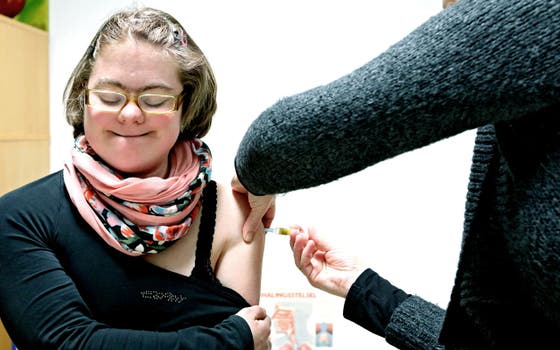Nov 17: Corona vaccines seem less effective in Down syndrome

Research by UMC Utrecht into the immune system after administration of a corona vaccine in adults with Down syndrome shows that they may be less well protected after two vaccinations. Based on, amongst others, this research, the Dutch Health Council today advised the Ministry of Health, Welfare and Sport (VWS) to offer all adults with Down syndrome a booster vaccination at an accelerated pace.
People with Down syndrome have a weaker immune system. As a result, they have an increased risk of becoming seriously ill if they are infected with the corona virus. In the Netherlands, people with Down syndrome are therefore given priority as a high-risk group to be vaccinated with Moderna, Pfizer or AstraZeneca. The PRIDE study that the UMC Utrecht has been conducting in collaboration with the RIVM since February 2021, investigates whether the less effective functioning of the immune system of people with Down also affects the effectiveness of the corona vaccines. The research is part of ZonMw's COVID-19 program, in which 8 studies are facilitated that focus on the effect of COVID-19 vaccines in specific populations.
Immune response but possibly less strong
The study involved 316 vaccinated participants, 224 of whom had Down syndrome. The first results of the study show that all participants developed an immune response after the vaccinations. However, 4 weeks after the second Pfizer or Moderna vaccination, lower antibody levels were found in people with Down syndrome compared to people without Down syndrome. After vaccination with AstraZeneca there are no differences between the two groups, but the antibody levels were on average lower than after Moderna or Pfizer (similar to the control group).
“Our research shows that 4 weeks after the second Pfizer or Moderna vaccination, adults with Down syndrome have lower levels of antibodies compared to people without Down syndrome”, said Prof. dr. Louis Bont, pediatric infectiologist-immunologist and principal investigator at UMC Utrecht.
What now?
The results of the PRIDE study have been presented to the Dutch Health Council. Based on this Utrecht study, among other things, the Health Council advised the Ministry of Health, Welfare and Sport will offer all adults with Down syndrome in the Netherlands an accelerated booster vaccination. Additional research has now also been set up to be able to investigate the antibodies after this booster. The antibodies will again be measured before and after the booster vaccination. Only people with Down syndrome who are already participating in the PRIDE study are eligible for the extension of the study.
Children with Down syndrome
Based on the current results, no advice can be given for children aged 12-17. The study in this age group is still in progress and it is still possible to sign up for it. The results of this part of the study will be announced at a later date.
About the other vaccine studies
People with a less well-functioning immune system are at increased risk of developing complications due to a COVID-19 infection. Moreover, we do not know well enough whether these people are sufficiently protected after vaccination. The 8 studies facilitated by ZonMw focus on the effect of COVID-19 vaccines in specific patient groups. In order to be able to quickly apply the acquired knowledge and to make transcending research possible, the studies in the Netherlands work together with jointly coordinated protocols and analytical methods.
